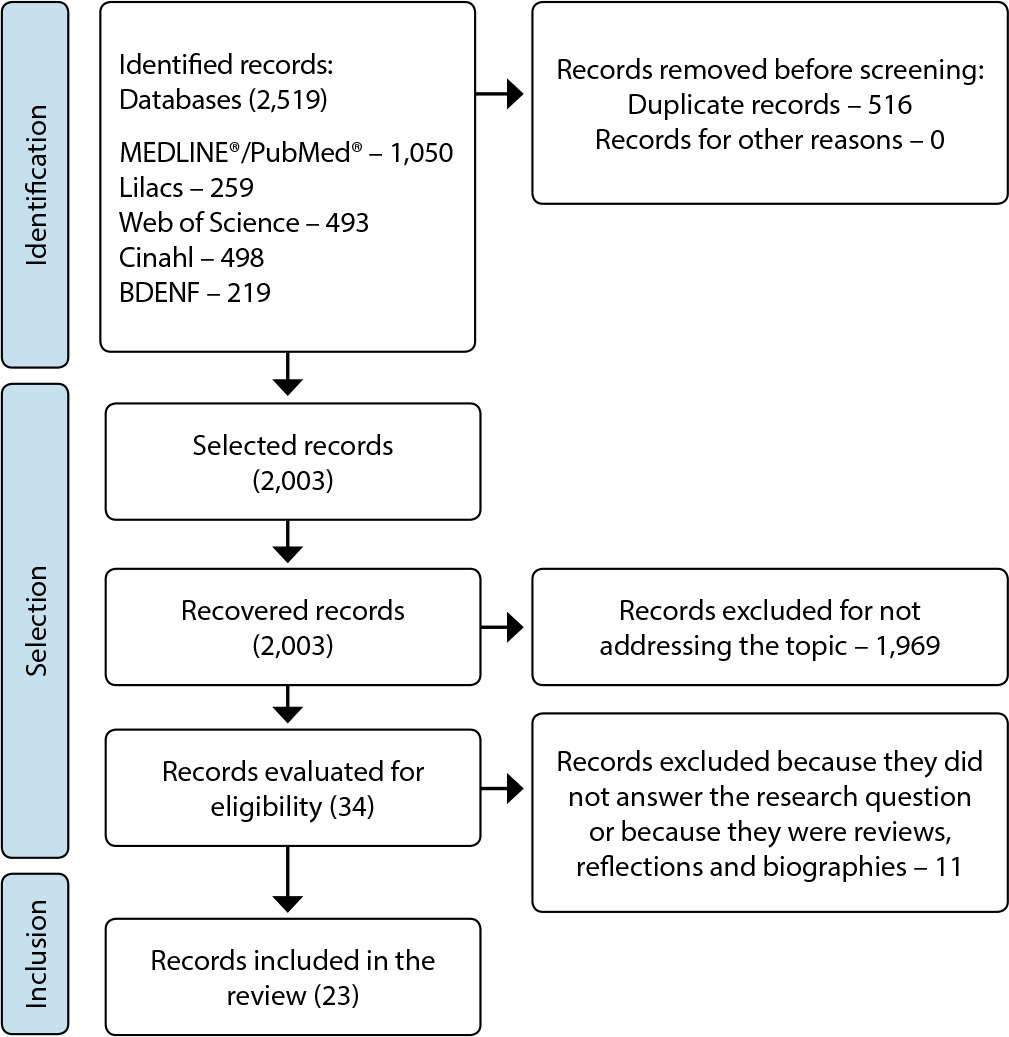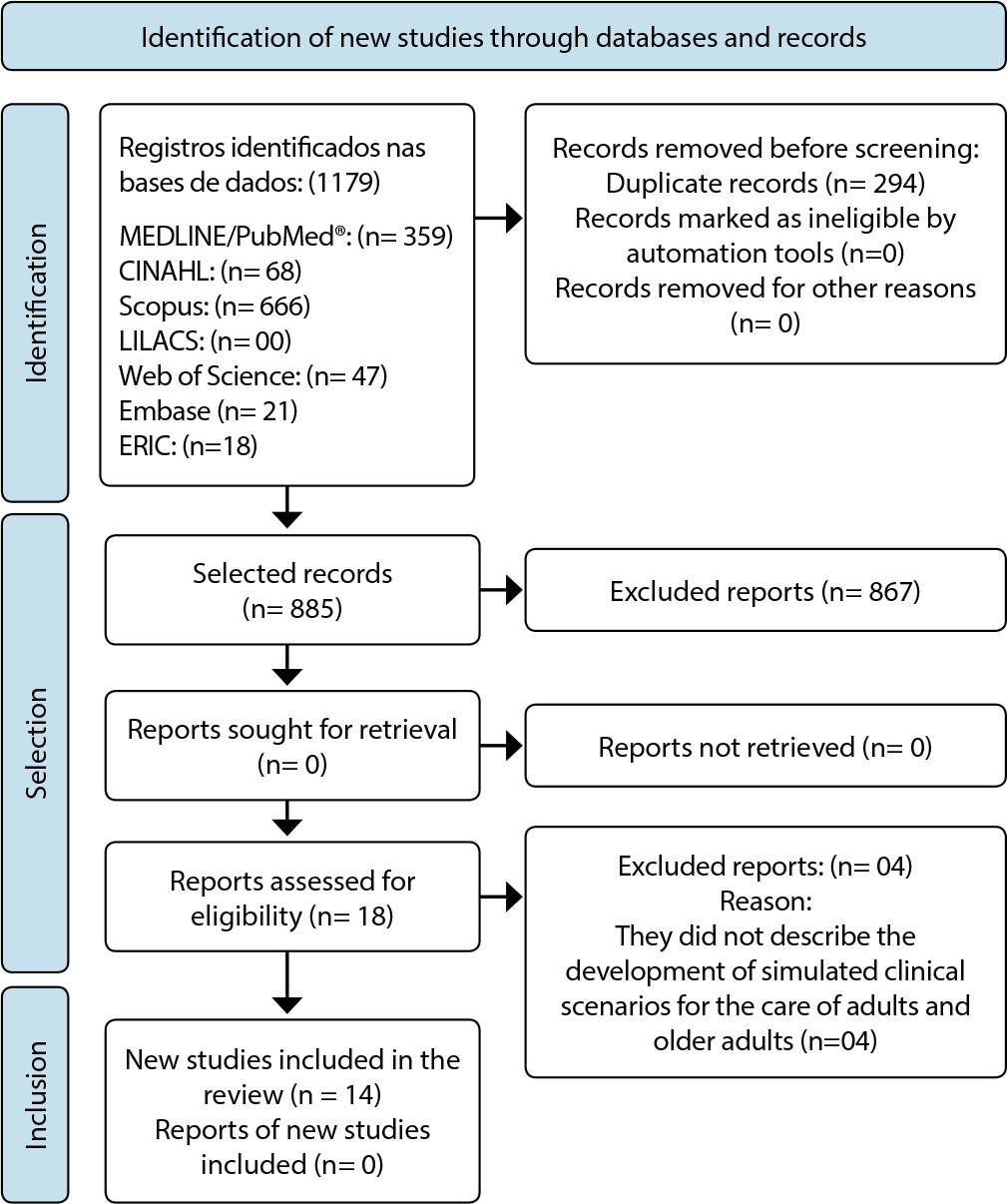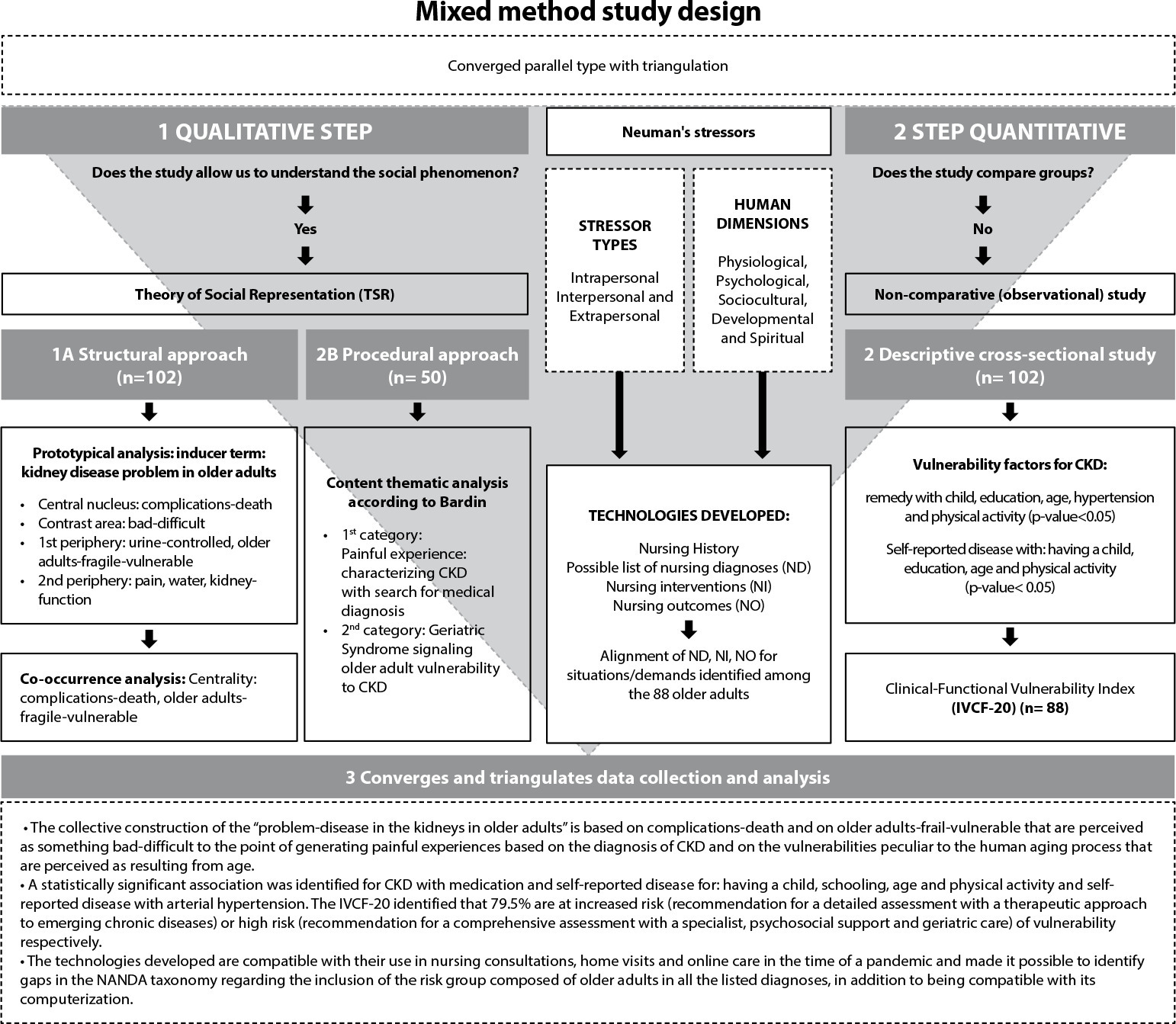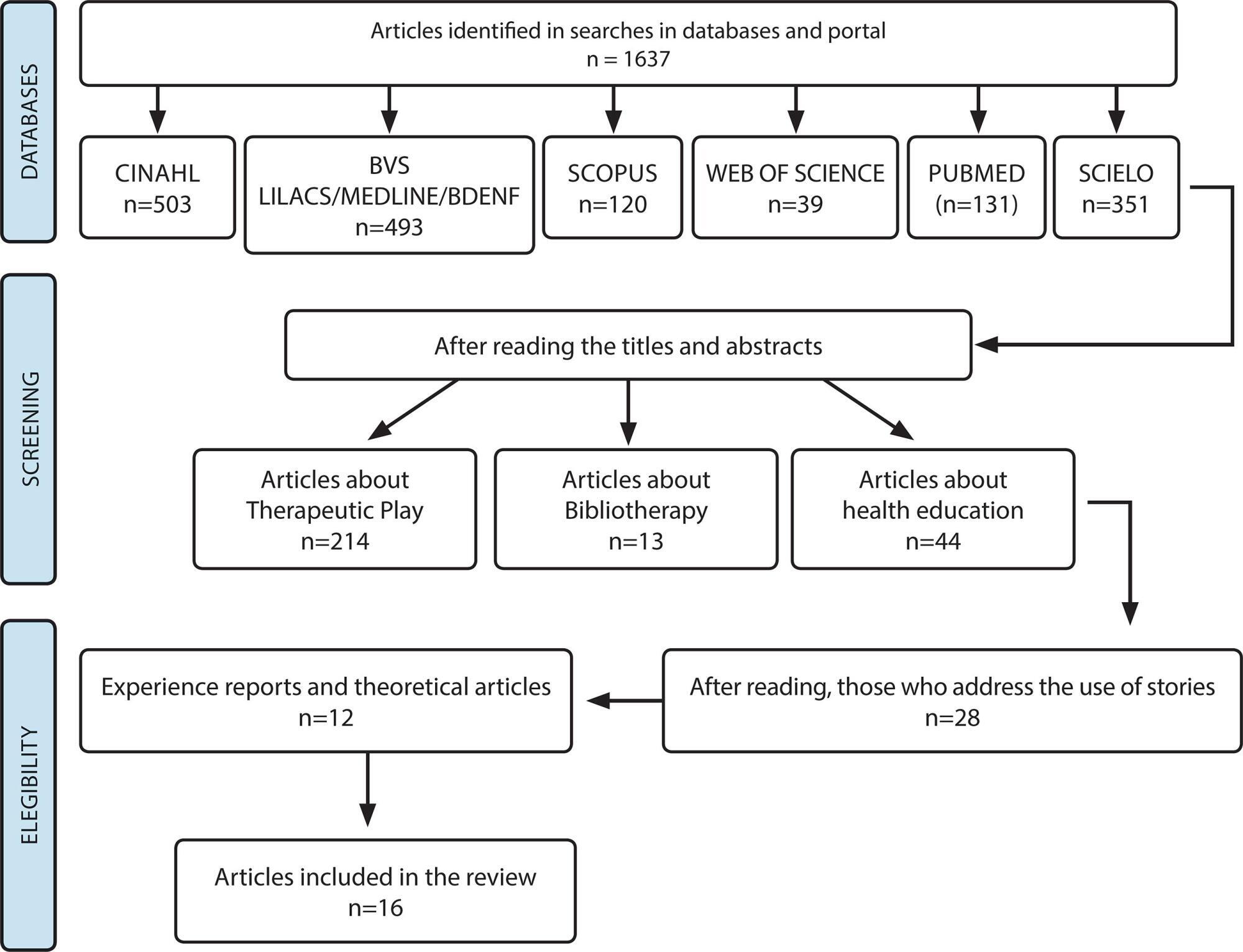-
ORIGINAL ARTICLE
Brazilian undergraduate nursing students’ critical thinking need to be increased: a cross-sectional study
Revista Brasileira de Enfermagem. 2023;76(1):e20220315
11-28-2023
Abstract
ORIGINAL ARTICLEBrazilian undergraduate nursing students’ critical thinking need to be increased: a cross-sectional study
Revista Brasileira de Enfermagem. 2023;76(1):e20220315
11-28-2023DOI 10.1590/0034-7167-2022-0315
Views0See moreABSTRACT
Objectives:
to map Brazilian undergraduate nursing students’ critical thinking level and investigate the correlation between selected sociodemographic data and critical thinking domains.
Methods:
in this descriptive cross-sectional study, participants’ (N=89) critical thinking was assessed using the Health Science Reasoning Test. Correlation between critical thinking domains and sociodemographic data was assessed using the Pearson correlation coefficient.
Results:
the overall results showed a moderate level of participants’ critical thinking (mean = 70.7; standard deviation 5.7). A poor performance was identified in 5 of the 8 critical thinking domains. A significant positive correlation was found between education period and critical thinking (p<.001).
Conclusions:
poor level in students critical thinking domains may lead to negative consequences for their learning outcomes. Further studies should be carried out to confirm our results, in addition to investigation of teaching methods that encourage and ensure the development of students’ critical thinking skills during nursing education.
-
REVIEW
Contributions of the institutions for the nursing professionalization: integrative review (2010-2020) in the light of freidsonian conceptions
Revista Brasileira de Enfermagem. 2023;76(1):e20220153
11-28-2023
Abstract
REVIEWContributions of the institutions for the nursing professionalization: integrative review (2010-2020) in the light of freidsonian conceptions
Revista Brasileira de Enfermagem. 2023;76(1):e20220153
11-28-2023DOI 10.1590/0034-7167-2022-0153
Views0See moreABSTRACT
Objective:
To analyze the contributions of the Brazilian Nursing Association and the Federal and Regional Nursing Councils in the literature for the professionalization of nursing in the light of Eliot Freidson’s theoretical conceptions.
Methods:
Integrative review of the literature, of socio-professional historical interest, carried out from June to November 2021, through the question: How did professional associations contribute to the professionalization of Brazilian nursing according to the literature from 2010 to 2020? The evidence were organized in a synoptic table, which allowed the construction of a conceptual map.
Results:
In the 23 selected studies, the professional associations presented scientific, social and political contributions, which shape the professional field of nursing, enabling knowledge/expertise, autonomy and self-regulation.
Final considerations:
The efforts of these institutions reaffirm nursing as an academic and consulting profession, capable of exerting control over the essence of nursing work. They strive to consolidate nursing as a legitimate professional field of health in Brazil.

-
EDITORIAL
The diagnosis and treatment of latent tuberculosis by nurses in Brazil: a necessary strategy
Revista Brasileira de Enfermagem. 2023;76(1):e760101
11-28-2023
Abstract
EDITORIALThe diagnosis and treatment of latent tuberculosis by nurses in Brazil: a necessary strategy
Revista Brasileira de Enfermagem. 2023;76(1):e760101
11-28-2023DOI 10.1590/0034-7167.2023760101
Views0Tuberculosis (TB) prevention, from preventing the progression of infection to active TB, is the main strategy to reduce its incidence and to reach the goals defined by the World Health Organization, according to the End TB strategy().Brazil, ranking 19th in terms of the number of cases, assumed its commitment to institute preventive treatment, especially among […]See more -
REVIEW
Simulated scenarios in nursing: an integrative literature review
Revista Brasileira de Enfermagem. 2023;76(1):e20220123
11-28-2023
Abstract
REVIEWSimulated scenarios in nursing: an integrative literature review
Revista Brasileira de Enfermagem. 2023;76(1):e20220123
11-28-2023DOI 10.1590/0034-7167-2022-0123
Views0See moreABSTRACT
Objectives:
to identify in scientific literature which simulated clinical scenarios were developed and validated for teaching and learning in nursing.
Methods:
integrative review, carried out in seven sources of information. The Rayyan program was used for selection, content analysis to explore the findings and the methodological assessment tool of the validity process, entitled Quality Appraisal tool for Validity Studies.
Results:
initially, 1,179 manuscripts were identified and 14 were part of the sample. Two categories were defined: Profile of simulated clinical scenarios produced in nursing; and Clinical skills developed and their assessment mechanisms.
Final Considerations:
there was a preponderance of high-fidelity scenarios, built in Brazil in the last five years, aimed at nursing students on the themes of emergency, maternal care and stomatherapy, addressing the assessment of cognitive, psychomotor and affective skills in nursing. Most studies obtained good methodological quality in their content validity process.

-
ORIGINAL ARTICLE
Factors associated with psychopathological symptoms among nurses at a university hospital
Revista Brasileira de Enfermagem. 2023;76(1):e20220075
11-28-2023
Abstract
ORIGINAL ARTICLEFactors associated with psychopathological symptoms among nurses at a university hospital
Revista Brasileira de Enfermagem. 2023;76(1):e20220075
11-28-2023DOI 10.1590/0034-7167-2022-0075
Views0See moreABSTRACT
Objectives:
to analyze the factors associated with psychopathological symptoms among nurses at a university hospital.
Methods:
a cross-sectional study developed at a university hospital in Pernambuco, in which 90 nurses participated. A questionnaire with social and professional characteristics and the Symptom Assessment Scale were used.
Results:
an association was found between the variable changing profession and the presence of characteristic symptoms of psychoticism, somatization and anxiety among nurses.
Conclusions:
the emergence of psychopathological symptoms has influenced nurses’ desire to search for another profession. This evidence reinforces the need for greater investments in better working conditions and welcoming actions in the work environment, in order to provide a better quality of professional life and promote the health of these workers.
-
ORIGINAL ARTICLE
O pensamento crítico dos estudantes de graduação em enfermagem brasileiros precisa ser ampliado: estudo transversal
Revista Brasileira de Enfermagem. 2023;76(1):e20220315
11-28-2023
Abstract
ORIGINAL ARTICLEO pensamento crítico dos estudantes de graduação em enfermagem brasileiros precisa ser ampliado: estudo transversal
Revista Brasileira de Enfermagem. 2023;76(1):e20220315
11-28-2023DOI 10.1590/0034-7167-2022-0315
Views0RESUMEN
Objetivos:
mapear el nivel de pensamiento crítico de los estudiantes brasileños de pregrado en enfermería e investigar la correlación entre los datos sociodemográficos seleccionados y los dominios del pensamiento crítico.
Métodos:
en este estudio transversal descriptivo, el pensamiento crítico de los participantes (N=89) fue evaluada mediante el Health Science Reasoning Test. La correlación entre los dominios de pensamiento crítico y los datos sociodemográficos se evaluó mediante el coeficiente de correlación de Pearson.
Resultados:
los resultados generales mostraron un nivel moderado de pensamiento crítico de los participantes (media=70,7; desviación estándar 5,7). Se identificó un desempeño deficiente en 5 de los 8 dominios del pensamiento crítico. Se encontró una correlación positiva significativa entre educación y pensamiento crítico (p<0,001).
Conclusiones:
los bajos niveles de los dominios del pensamiento crítico en los estudiantes pueden tener consecuencias negativas para sus resultados de aprendizaje. Se deben realizar más estudios para confirmar nuestros resultados, además de la investigación de métodos de enseñanza que fomenten y aseguren el desarrollo de habilidades de pensamiento crítico de los estudiantes durante su formación en enfermería.
Keywords:Educação em EnfermagemEstudantes de EnfermagemEstudos TransversaisPensamento CríticoServiços de SaúdeSee more -
ORIGINAL ARTICLE
Nursing protocol in chronic kidney disease prevention in older adults in primary care
Revista Brasileira de Enfermagem. 2023;76(1):e20220052
11-28-2023
Abstract
ORIGINAL ARTICLENursing protocol in chronic kidney disease prevention in older adults in primary care
Revista Brasileira de Enfermagem. 2023;76(1):e20220052
11-28-2023DOI 10.1590/0034-7167-2022-0052
Views0See moreASBTRACT
Objectives:
to develop a protocol for Nursing Process operationalization in approaching older adults with vulnerability to chronic kidney disease in Primary Health Care, based on Neuman’s stressors.
Methods:
a methodological study, carried out in two stages: 1) synthesis of evidence using an inductive strategy (mixed method study) and 2) protocol development to support the nursing process operationalization with older adults enrolled in a Basic Health Unit, using a deductive strategy (Neuman’s stressor concepts, NANDA, NIC, and NOC taxonomies, Risner’s line of reasoning, and cross-mapping), described according to A Step-by-Step Guide to Developing Protocols.
Results:
102 older adults participated, and 17 diagnoses, 34 interventions and 26 nursing outcomes were identified.
Conclusions:
the protocol developed is a technology that makes it possible to operationalize the Nursing Process, based on Neuman’s stressors and on taxonomy, conceptual and care frameworks, guiding care and nursing records.

-
ORIGINAL ARTICLE
Handgrip strength in older adults and driving aptitude
Revista Brasileira de Enfermagem. 2023;76(1):e20210729
11-28-2023
Abstract
ORIGINAL ARTICLEHandgrip strength in older adults and driving aptitude
Revista Brasileira de Enfermagem. 2023;76(1):e20210729
11-28-2023DOI 10.1590/0034-7167-2021-0729
Views0See moreABSTRACT
Objective:
to analyze handgrip strength as a predictor of the inability to drive in older adults.
Method:
a cross-sectional study conducted in traffic clinics with 421 older adults in Curitiba-Paraná from January 2015 to December 2018. A sociodemographic and clinical questionnaire, handgrip strength test, and queries from the National Registry of Qualified Drivers form were applied.
Results:
Reduced handgrip strength was not a predictor of inaptitude for vehicular driving (p=0.649). The predictors of inaptitude were: low education (p=0.011), incomplete elementary education (p=0.027), and cognition (p=0.020).
Conclusion:
reduced handgrip strength was not shown to predict for loss of driving skills in older adults. Low education level and reduced cognition level are conditions that were shown to be predictors for loss of vehicular driving license.
-
ORIGINAL ARTICLE
Team-Based Learning: a randomized clinical trial in undergraduate nursing
Revista Brasileira de Enfermagem. 2020;73(2):e20180621
03-30-2020
Abstract
ORIGINAL ARTICLETeam-Based Learning: a randomized clinical trial in undergraduate nursing
Revista Brasileira de Enfermagem. 2020;73(2):e20180621
03-30-2020DOI 10.1590/0034-7167-2018-0621
Views0ABSTRACT
Objectives:
To compare the knowledge on surgical safety through the team-based learning methodology and lecture classes for undergraduate Nursing students, and evaluate the learning satisfaction with team-based learning.
Methods:
Randomized, controlled, parallel, two-arm, unblinded clinical trial developed in the Faculty of Medicine of a public university in Botucatu, Brazil. The groups included 14 students for team-based learning and 11 students for lecture classes.
Results:
Students’ apprehension of knowledge in the team-based learning group was significantly higher compared to the control group (p<0.002) by considering the pre-test results. After 30 days, there was no significant difference between groups. The experience with the methodology was considered positive among students.
Conclusions:
Team-based learning is an important pedagogic tool available and has proven effective in education and learning with students playing the role of protagonists.
Keywords:Higher EducationNursingPatient SafetyRandomized Controlled Clinical TrialValidation StudiesSee more
-
Factors associated with anxiety in multiprofessional health care residents during the COVID-19 pandemic
Revista Brasileira de Enfermagem. 2021;74:e20200961
04-14-2021
Abstract
Factors associated with anxiety in multiprofessional health care residents during the COVID-19 pandemic
Revista Brasileira de Enfermagem. 2021;74:e20200961
04-14-2021DOI 10.1590/0034-7167-2020-0961
Views0See moreABSTRACT
Objective:
To estimate the prevalence and factors associated with anxiety among multiprofessional health residents during the COVID-19 pandemic.
Methods:
Cross-sectional study, conducted in July 2020 with multiprofessional health residents (n = 67) from a university hospital. We used the Beck Anxiety Inventory to assess anxiety. Analyzing data through the chi-square test, likelihood ratio, and multiple analysis using Poisson regression with robust variance.
Results:
The proportion of moderate/severe anxiety was 31.3%, which showed significant association with working in sectors involving COVID-19 and directly with suspected/confirmed cases of COVID-19. During the multiple analysis, we found prevalence of anxiety in participants who needed psychological support after entering their residence and those who used psychotropic meds.
Conclusion:
The results seem to indicate that residents had their mental health impaired during the pandemic, but the maintenance of the variables in the model also suggests that they sought help to control anxiety.
-
REVIEW
The use of children’s stories in nursing care for the child: an integrative review
Revista Brasileira de Enfermagem. 2019;72:333-342
12-13-2019
Abstract
REVIEWThe use of children’s stories in nursing care for the child: an integrative review
Revista Brasileira de Enfermagem. 2019;72:333-342
12-13-2019DOI 10.1590/0034-7167-2018-0456
Views0See moreABSTRACT
Objective:
To identify how children’s stories can be used in child care.
Method:
Integrative literature review, conducted in databases between 2000 and 2018, in three languages. Full research articles were included that agreed with the following question: “How can children’s stories be used in child care?”.
Results:
From the analysis of 16 selected articles, three categories emerged: The use of stories in the hospital; Specialized nursing intervention; and Stories in the educational dimension.
Final considerations:
Evidence shows benefits to children, families, institutions and nursing. The use of children’s stories as a care intervention can occur in different situations and settings, values; boosts bonds, reduces anxiety in children and families, encourages children’s participation in care, and promotes health education. It is a low-cost and still incipient strategy in nursing.

-
ORIGINAL ARTICLE
Nursing practices in a psychological care center
Revista Brasileira de Enfermagem. 2020;73(1):e20180175
02-10-2020
Abstract
ORIGINAL ARTICLENursing practices in a psychological care center
Revista Brasileira de Enfermagem. 2020;73(1):e20180175
02-10-2020DOI 10.1590/0034-7167-2018-0175
Views0ABSTRACT
Objective:
To analyze the practices developed by nursing professionals in a Psychosocial Care Center (CAPS).
Method:
A qualitative and evaluative research based on the Fourth Generation Assessment and conducted in a CAPS II of Santa Catarina State in 2014. For data collection, semi-structured interviews, field observation, and data recycling group were used with workers. Constant Comparative Method was used for data analysis.
Results:
Practices aimed at the subject and their clinical, social, prevention, treatment and articulation with the health network were identified. Medication care is a specificity of nursing that aims to promote autonomy and social reintegration. There is a need for greater articulation between the nursing and pharmacy staff, as well as creating spaces for users to talk about medication.
Conclusion:
Nursing practices are focused on biopsychosocial care, aiming to deconstruct care models focused on the disease and symptoms.
Keywords:Health Services EvaluationMental HealthMental Health ServicesNursing ProcessPsychiatric NursingSee more -
REFLECTION
Empathic listening: welcoming strategy for nursing Professional in coping with with the coronavirus pandemic
Revista Brasileira de Enfermagem. 2021;74:e20200721
02-05-2021
Abstract
REFLECTIONEmpathic listening: welcoming strategy for nursing Professional in coping with with the coronavirus pandemic
Revista Brasileira de Enfermagem. 2021;74:e20200721
02-05-2021DOI 10.1590/0034-7167-2020-0721
Views0See moreABSTRACT
Objective:
to reflect on empathic listening use as a welcoming strategy for nursing professionals to cope with the challenges during the pandemic caused by the new coronavirus.
Methods:
this is a reflection study based on updated data surveys and theoretical-conceptual aspects of Non-Violent Communication and empathic listening.
Results:
in the performance during the COVID-19 pandemic, nursing professionals are exposed to violence of different natures related to occupational stress, work overload, anguishes and silenced suffering, with implications for the workers’ health, who can be benefited and strengthened with empathetic listening.
Final considerations:
the health crisis has highlighted the weaknesses of the health system. Nursing acts as the largest contingent of the health workforce in coping with the pandemic. Empathetic listening is a powerful strategy in caring for and strengthening nursing professionals.
-
ORIGINAL ARTICLE
Factors associated with stress, anxiety and depression in nursing professionals in the hospital context
Revista Brasileira de Enfermagem. 2022;75:e20210263
02-25-2022
Abstract
ORIGINAL ARTICLEFactors associated with stress, anxiety and depression in nursing professionals in the hospital context
Revista Brasileira de Enfermagem. 2022;75:e20210263
02-25-2022DOI 10.1590/0034-7167-2021-0263
Views0See moreABSTRACT
Objective:
to determine the factors associated with stress, anxiety and depression, concomitantly, in nursing professionals who work in the hospital context.
Methods:
a quantitative and cross-sectional study with 353 nursing professionals from a hospital. A sociodemographic questionnaire and the Depression, Anxiety and Stress Scale-21 were used. Data were subjected to descriptive statistical analysis, difference and correlation tests.
Results:
the main factors associated with stress, anxiety and depression, concomitantly, were being female, compromised family and social support, lack of autonomy at work, hostile relationship with colleagues, lack of professional recognition and satisfaction, feeling of being overwhelmed and insecurity.
Conclusions:
demographic, physiological, social and work factors impact the levels of stress, anxiety and depression in nursing professionals. The adoption of coping strategies for modifiable factors should be considered, in order to provide better quality of life for these professionals.
-
Repercussions of intestinal ostomy on male sexuality: an integrative review
Revista Brasileira de Enfermagem. 2020;73(6):e20190245
08-10-2020
Abstract
Repercussions of intestinal ostomy on male sexuality: an integrative review
Revista Brasileira de Enfermagem. 2020;73(6):e20190245
08-10-2020DOI 10.1590/0034-7167-2019-0245
Views0INTRODUCTIONThe intestinal ostomy, also known as stoma and ostomy, consists of an artificial opening, produced surgically, whose purpose is to divert the flow of effluents to the external environment. Such a condition can impact the lives of affected individuals due to transformations that affect human multi-dimensionality, including negative repercussions involving sexuality(–).In the United States of […]See more
Search
Search in:
Nuvem de Tags
Aged (144) Atenção Primária à Saúde (239) COVID-19 (104) Cuidados de Enfermagem (269) Educação em Enfermagem (151) Educação em Saúde (139) Enfermagem (930) Estudos de Validação (131) Health Education (144) Idoso (208) Mental Health (149) Nursing (987) Nursing Care (306) Patient Safety (151) Primary Health Care (284) Qualidade de Vida (104) Quality of Life (106) Saúde Mental (145) Segurança do Paciente (150) Validation Studies (108)



